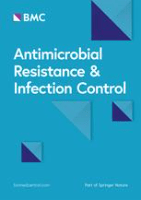
Antimicrobial Resistance and Infection Control
Scope & Guideline
Pioneering studies for effective infection management.
Introduction
Aims and Scopes
- Infection Prevention and Control (IPC) Strategies:
The journal emphasizes the assessment, implementation, and evaluation of infection prevention measures in healthcare settings to mitigate the spread of antimicrobial resistance (AMR) and healthcare-associated infections (HAIs). - Antimicrobial Stewardship Programs:
Research on the development, implementation, and effectiveness of antimicrobial stewardship initiatives aimed at optimizing antibiotic use and reducing resistance patterns is a key focus area. - Epidemiological Studies:
The journal publishes studies analyzing the epidemiology of AMR pathogens, providing insights into resistance patterns, transmission dynamics, and risk factors associated with infections in various populations. - Healthcare Worker Education and Compliance:
Exploring knowledge, attitudes, and practices of healthcare workers regarding infection control and antimicrobial use is vital to the journal's mission, aiming to enhance compliance and reduce infection rates. - Global Health Perspectives:
The journal addresses antimicrobial resistance as a global health challenge, including perspectives from low- and middle-income countries, and emphasizes the importance of international collaboration in combating AMR.
Trending and Emerging
- Impact of COVID-19 on Antimicrobial Practices:
Recent publications have increasingly focused on how the COVID-19 pandemic has influenced antibiotic prescribing practices, infection control measures, and the overall landscape of antimicrobial resistance. - Integration of Technology in Infection Control:
There is a growing interest in the application of technology, such as automated surveillance systems and artificial intelligence, to enhance infection prevention and monitoring efforts in healthcare settings. - Community Engagement in Antimicrobial Stewardship:
Emerging research highlights the importance of community involvement and public education in addressing antimicrobial resistance, indicating a shift towards a more holistic approach to stewardship. - One Health Approach:
The journal has seen an increase in studies adopting a One Health perspective, recognizing the interconnectedness of human, animal, and environmental health in the emergence and spread of antimicrobial resistance. - Global Surveillance and Policy Development:
There is a trend towards research focused on global surveillance of antimicrobial resistance and the development of policies to combat AMR, particularly in low- and middle-income countries.
Declining or Waning
- Basic Laboratory Research on Resistance Mechanisms:
There has been a noticeable decline in the publication of fundamental laboratory studies exploring the molecular mechanisms underlying antimicrobial resistance, as the journal shifts towards more applied research with direct clinical relevance. - Single Pathogen Studies:
Research focusing exclusively on a single pathogen has become less frequent, as studies increasingly adopt a broader, multi-pathogen perspective to address the complexity of AMR and HAIs. - Historical Epidemiological Reviews:
There appears to be a reduction in the publication of historical reviews on the epidemiology of AMR, as the journal pivots towards contemporary studies that address current challenges and solutions.
Similar Journals

Annals of Clinical Microbiology and Antimicrobials
Connecting researchers to the latest advancements in infectious diseases.Annals of Clinical Microbiology and Antimicrobials, published by BMC, is a leading open-access journal that has been fostering scientific discourse in the fields of microbiology and infectious diseases since its inception in 2002. With an established reputation for excellence, this journal is positioned in the prestigious Q1 category across multiple disciplines, including Infectious Diseases, Medicine (miscellaneous), and Medical Microbiology as of 2023. This journal serves as a vital platform for researchers, healthcare professionals, and students, promoting the latest advancements in clinical microbiology and antimicrobial research. Access to its invaluable content is open to all, reflecting the commitment to disseminate knowledge universally. The Annals of Clinical Microbiology and Antimicrobials is based in the United Kingdom and continues to pave the way for innovation and discussions that shape the future of clinical practices in microbiology.
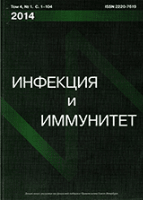
Infektsiya i Immunitet
Advancing knowledge in immunology and infectious diseases.Infektsiya i Immunitet, published by the esteemed SANKT-PETERSBURG-NIIEM IMENI PASTERA, is a prominent open access journal that has been disseminating vital research findings since 2011. Focusing on the fields of immunology and infectious diseases, this journal serves as a critical platform for scholars, professionals, and students in the Russian Federation and beyond. With an ISSN of 2220-7619 and an E-ISSN of 2313-7398, it currently holds a Q4 ranking in 2023 for both Immunology and Infectious Diseases, along with notable quartile standings in related fields. Despite its emerging status, Infektsiya i Immunitet provides valuable insights and contributes to the growing discourse on immunity and infection prevention strategies, making it an essential resource for those invested in advancing knowledge and enhancing public health outcomes. Researchers can conveniently access its wealth of articles and studies that bridge theoretical understanding and practical implications in their respective domains.
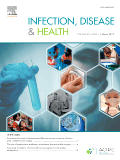
Infection Disease & Health
Fostering Interdisciplinary Dialogue in Infectious Disease ResearchInfection Disease & Health, published by Elsevier Inc, serves as a premier interdisciplinary journal dedicated to advancing the fields of infectious diseases, public health, and nursing. With an impressive impact factor reflective of its rigorous scholarly contributions, the journal is currently indexed within the Q2 category in Infectious Diseases and Q1 in Nursing (miscellaneous) as of 2023, indicating its esteemed position in these areas. Launched in 2016, it has rapidly established itself as a valuable resource for researchers, clinicians, and students alike, emphasizing both original research and comprehensive reviews that address pressing health challenges. Authors and readers are encouraged to engage with a wealth of content that is meticulously curated to inform and inspire innovative practices within the health sector. While the journal is not an open-access platform, it offers various access options to enhance dissemination of knowledge. As the field of infectious diseases evolves, Infection Disease & Health remains at the forefront, fostering scholarly dialogue and contributing to the development of effective health strategies globally.
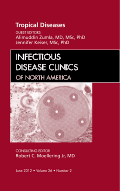
INFECTIOUS DISEASE CLINICS OF NORTH AMERICA
Empowering Professionals with Cutting-Edge ResearchINFECTIOUS DISEASE CLINICS OF NORTH AMERICA, published by W B SAUNDERS CO-ELSEVIER INC, stands as a premier academic resource in the field of infectious diseases and microbiology. With its ISSN 0891-5520 and E-ISSN 1557-9824, this esteemed journal has been at the forefront of disseminating critical research findings and clinical advancements since its inception in 1987. Known for its high impact, the journal ranks in the Q1 category for both Infectious Diseases and Medical Microbiology as of 2023, which underscores its significant contribution to advancing knowledge and practice in these vital areas. Researchers, practitioners, and students alike rely on its comprehensive yet concise reviews and original articles, ensuring they stay abreast of emerging trends and therapeutics in infectious disease management. Although it does not offer open access, the journal remains pivotal in enriching scholarly dialogue and influencing clinical practices in the United States and beyond. Explore this vital publication and join a community dedicated to excellence in infectious disease research.

GMS Hygiene and Infection Control
Elevating hygiene standards through scholarly discourse.GMS Hygiene and Infection Control is a leading open access journal dedicated to advancing knowledge and research in the fields of hygiene, infection control, and public health. Published by GERMAN MEDICAL SCIENCE-GMS, this journal has been offering unrestricted access to its rich repository of scholarly articles since 2013, making significant contributions to the global discourse on infection prevention and control strategies. With its commitment to promoting high-quality research, GMS Hygiene and Infection Control is a vital resource for researchers, healthcare professionals, and students engaged in the pursuit of best practices for improving health outcomes. The journal is built upon a foundation of rigorous peer review and aims to disseminate innovative findings that address current challenges in hygiene and infection control, thereby enhancing clinical practices and public health policies worldwide.

Journal of Infection and Public Health
Transforming Insights into Action for Global HealthJournal of Infection and Public Health is a premier open-access journal published by ELSEVIER SCIENCE LONDON, dedicated to advancing knowledge in the fields of infectious diseases, public health, and environmental health. Since its inception in 2008, this esteemed journal has become a cornerstone of research dissemination, especially after transitioning to an open-access model in 2017, allowing wider accessibility to groundbreaking studies. With an impressive impact factor and ranking in the Q1 category for Infectious Diseases and Public Health as of 2023, the journal stands at the forefront of scientific inquiry, boasting a Scopus rank of #22 out of 665 in Public Health, underscoring its influence and reach in the academic community. Researchers, professionals, and students alike will find the journal's rich repository of peer-reviewed articles invaluable for ongoing education and practice in a rapidly evolving field. For contributing to the global understanding of health dynamics, Journal of Infection and Public Health is a vital resource, inviting scholars to explore, engage, and contribute to the crucial discussions shaping our world.
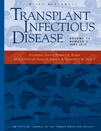
Transplant Infectious Disease
Navigating the landscape of infectious complications in transplant recipients.Transplant Infectious Disease is a premier journal dedicated to advancing the understanding of infectious complications in transplant recipients, contributing significantly to the fields of Infectious Diseases and Transplantation. Published by Wiley in the United Kingdom, this journal boasts an impressive reputation within the academic community, holding a 2023 Q2 quartile ranking in both Infectious Diseases and Transplantation, as well as notable Scopus rankings that position it among the top tiers of its categories. With a convergence of scholarly articles and research findings from 1999 through 2024, Transplant Infectious Disease serves as a critical resource for researchers, professionals, and students seeking to explore the intersection of transplantation and infectious diseases. The journal encourages open dialogue and knowledge dissemination through rigorous peer-reviewed content, making it an essential platform for those aiming to address the challenges and innovations in transplant medicine.

CLINICAL MICROBIOLOGY AND INFECTION
Advancing the Science of InfectionCLINICAL MICROBIOLOGY AND INFECTION is a leading journal published by Elsevier Science Ltd, dedicated to advancing the field of infectious diseases and clinical microbiology. With its ISSN 1198-743X and E-ISSN 1469-0691, this esteemed journal has maintained its influential presence since 1995, showcasing high-impact research that addresses critical issues in the diagnosis, treatment, and prevention of infections. Ranked in the Q1 quartile for Infectious Diseases, Medicine (miscellaneous), and Microbiology (medical) categories, and boasting impressive Scopus rankings of #12 and #7 respectively, it sits at the forefront of scientific inquiry in these disciplines. Although it is not an Open Access journal, it provides comprehensive access options for institutions and individuals, ensuring the dissemination of vital research findings. As the field of clinical microbiology continues to evolve, CLINICAL MICROBIOLOGY AND INFECTION remains an essential resource for researchers, clinicians, and students aiming to stay informed on the latest developments and breakthroughs in understanding infectious diseases.
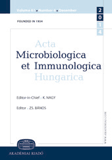
ACTA MICROBIOLOGICA ET IMMUNOLOGICA HUNGARICA
Fostering collaboration in infectious disease research.ACTA MICROBIOLOGICA ET IMMUNOLOGICA HUNGARICA is a distinguished academic journal published by AKADEMIAI KIADO ZRT, focusing on significant advancements in the fields of microbiology, immunology, and infectious diseases. Established in 1994, this journal serves as a vital platform for researchers, professionals, and students keen on exploring the complexities of microbial interactions and immune responses. With a current Impact Factor reflecting its rank within the Q3 categories for Immunology, Microbiology, and Infectious Diseases, it retains a critical position in disseminating innovative research. Although not open access, the journal provides extensive insights disseminated through various academic databases, ensuring a broad reach within the scholarly community. Its convergence over three decades indicates a robust commitment to excellence in scientific inquiry and knowledge sharing. As it moves towards the future, ACTA MICROBIOLOGICA ET IMMUNOLOGICA HUNGARICA continues to uphold its legacy of fostering collaborative research initiatives that contribute to the understanding and treatment of microbial diseases globally.

Infection Prevention in Practice
Bridging research and practice in infectious disease management.Infection Prevention in Practice is a leading academic journal published by ELSEVIER that has established itself as a vital resource in the domains of Infectious Diseases and Public Health. With its Open Access policy implemented since 2019, the journal enhances global accessibility to cutting-edge research and practical insights aiming to reduce the risk of infections in various settings. It proudly holds a Q3 ranking in Infectious Diseases and a Q2 ranking in Public Health, Environmental and Occupational Health as of 2023, showcasing its impact and relevance within the scientific community—particularly with a Scopus rank placing it in the 71st percentile for public health research. Its scope includes the latest advancements, strategies, and practices in infection prevention, making it an indispensable read for researchers, healthcare professionals, and students dedicated to improving health outcomes and combating infectious diseases effectively. The journal operates from its base in the United Kingdom and reaches a global audience, fostering collaboration and innovation in infection control practices.